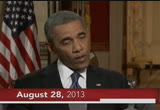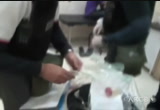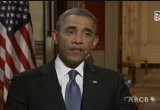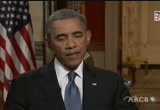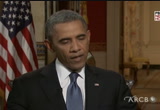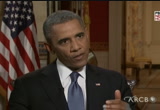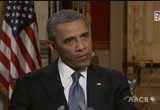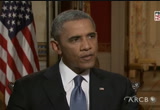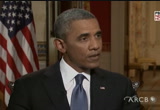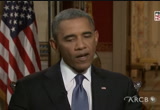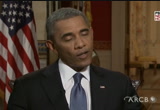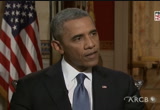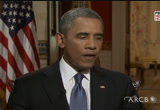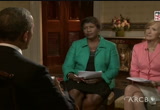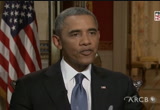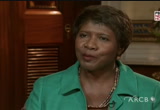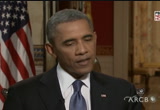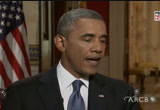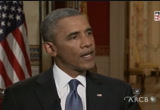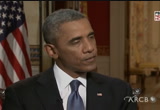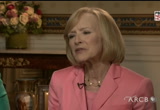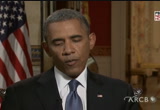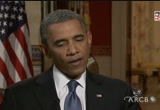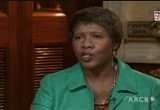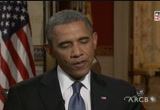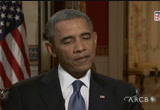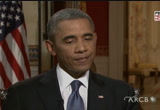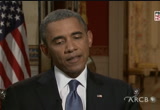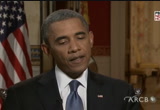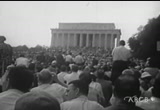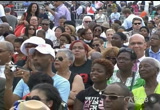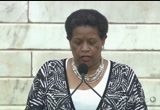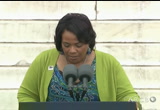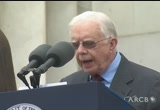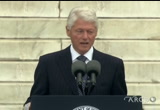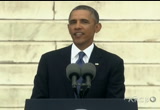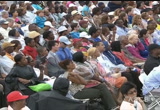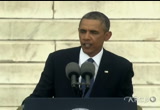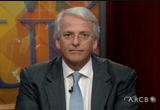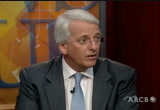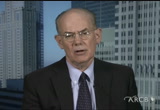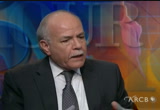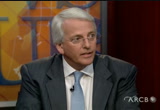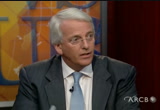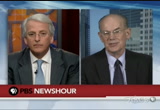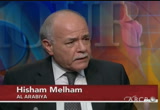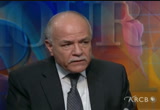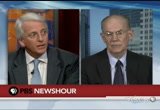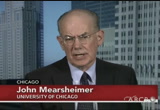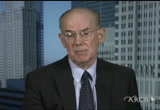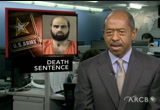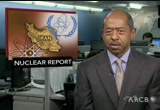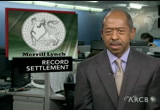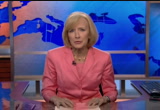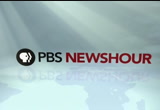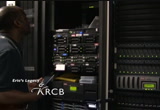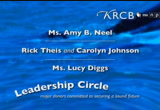tv PBS News Hour PBS August 28, 2013 5:30pm-6:31pm PDT
5:30 pm
captioning sponsored by macneil/lehrer productions >> ifill: good evening. i'm gwen ifill. >> woodruff: and i'm judy woodruff. >> ifill: tonight, an exclusive interview with president obama at the white house. >> woodruff: we discuss the potential for military action in syria. >> we do have to make sure is that when countries break international norms on weapons like chemical weapons that could threaten us, that they are held accountable. >> ifill: and we get his take on race relations in america, following his speech at the lincoln memorial today, 50 years after the march on washington.
5:31 pm
>> no one can match king's brilliance but the same flame can light the heart of all who are willing to take a first step towards justice. i know that flame remains. >> woodruff: that's all ahead on tonight's "newshour." >> major funding for the pbs newshour has been provided by: >> supported by the john d. and catherine t. macarthur foundation. committed to building a more just, verdant and peaceful world. more information at macfound.org >> and with the ongoing support of these institutions and foundations. and... >> this program was made possible by the corporation for public broadcasting. and by contributions to your pbs station from viewers like you. thank you.
5:32 pm
>> ifill: there was a flurry of activity around the world today on what happens next in syria. at the united nations, britain submitted a resolution to the security council condemning syria for an alleged chemical attack, and authorizing the use of force in response. the u.n. envoy to syria, lakhdar brahimi, warned any military action must have the world body's approval. but russia and china appeared likely to use their vetoes, as they have on previous syria resolutions. in turn, u.s. officials made clear that plans for a possible military strike are continuing-- with or without u.n. approval. and in syria, u.n. inspectors returned to the site of the alleged gassing, protected by rebels. the u.n. secretary-general said they need four to five days to finish, but the assad regime demanded they also investigate chemical attacks by rebel forces. this was how things stood when president obama sat down with
5:33 pm
judy and me at the white house a short time ago. hello, mr. president. thank you so much for joining us. >> really appreciate it. thank you. >> woodruff: and welcome to the "newshour." >> great to be here. >> woodruff: mr. president, you've just come from making a speech celebrating a flawn violent event, the march on washington, martin luther king's speech 50 years ago. we're going to get to that in just a moment but first we want to ask you about a place where there's been too much violence, syria. how close are you tho authorize, a military strike and can you assure the american people that by doing so, given iraq and afghanistan, that the united states will not get bogged down in yet another war halfway around the world? >> well, first of all, i have not made a decision. i have gotten options from our military, had extensive discussions with my national security team, so let me talk about what's at stake here. i think we all understand terrible things have been happening in syria for quite some time, that the assad regime
5:34 pm
there has been killing its own people by the tens of thousands, that there are sectarian arguments that have spilled over into bloodshed, and have escalated over the last couple of years. and although what's happened there is tragic, andil anding ah i have called for assad to leave and make sure we have a transitional government that could be incliews 95 syria, what i've also concluded is engagement and involve enemy sir war in syria would not help the situation on the ground. we have been very restrained, and have been providing a lot of humanitarian aid to people who have been displaced by the war. but what i also said was that if the assad regime used chemical weapons on his own people, that that would change some of our calculations, and the reason has
5:35 pm
to do with not only international norms but also america's core self-interests. we've got a situation in which you've got a well-established international norm against the use of chemical weapons. syria has one of the largest stockpiles in the world of chemical weapons. this is a volatile country in a very volatile region. we've got allies bordering syr syria. turkey is a nato ally. jordan, a close friend that we work with a lot. israel is very close by. we've got bases throughout the region. we cannot see a breach of the nonproliferation norm that allows potentially chemical weapons to fall into the hands of all kinds of folks. so what i've said is that we have not yet made a decision, but the international norm against the use of chemical weapons needs to be kept in place, and nobody disputes-- or
5:36 pm
hardly anybody disputes -- that qems were used on a large scale in syria against civilian populations. we have looked at all the evidence, and we do not believe the opposition possessed chemical weapons of that sort. we do not believe, given the delivery system-- using rockets that the opposition could have carried out these attacks. we have concluded that the syrian government in fact carried it out, and if that's so, there need to be international consequence. so we are consulting with our allies. we are consulting with the international community, and, you know, i have no interest in any kind of open-ended conflict in syria but we cohave to make sure that when countries break international norms on weapons like chemical weapon that's would threaten us that they are held accountable. >> woodruff: mr. president, with all due respect, what has it accomplished. the signals the american people
5:37 pm
are getting is this would be a limited strike over limited duration. if it's not going to do that much harm to the assad regime what, have you accomplished? what's changed? >> again, i have not made a decision, but i think it's important that if in fact we make a choice to have repercussions for the use of chemical weapons, then the assad regime, which is involved in a civil war trying to protect itself, will have received a pretty strong signal that in fact it better not do it again. and that doesn't solve all the problems inside of syria. and, you know, it doesn't, obviously, end the death of innocent civilians inside of syria. and we hope that in fact ultimately a political transition can take place inside of syria, and we're prepared to work with anybody it's russians and others -- to try to bring the parties together to resolve the conflict. but we want the assad regime
5:38 pm
tond that by use, chemical weapons on a large scale against your own people, against women, against infants, against children, that you are not only breaking international norms ask standards of decency, but you're also creating a situation where u.s. national interests are affected. and that neez to stop. >> ifill: mr. president, with all of the mayhem in the middle east involving allies like israel and jordan and refugees on the border and potential action in syria and the collapse of the government in egypt, do you worry at all that your administration underestimated what the toll would be of an arab spring? >> well, i don't-- i think we anticipated this would be a really difficult process. i mean, you've got a region that for decades has basically been under autocratic rule, and
5:39 pm
people had been suppressed and there were no traditions of civil society. there were no traditions of political freedom. and then suddenly, folks are allowed to express themselves, but a lot of their organizing principles end up being around extremist agendas in some cases, more moderate forces sometimes haven't yet gotten their act together. so we anticipated that this was going to be a very difficult path. we're not surprised by it. the one thing, though, maybe implicit in your question, gwen ssome suggestion that there was something we could do-- >> ifill: that was implicit in my question, yes. >> and i think if the idea is that what we should have done is done popular to shore up auntocrattic governments, that we should have stood by while governments that we had relationships with killed their
5:40 pm
own people, peaceful, innocent protesters, then i suspect you'd have a different set of questions for me. and so we don't have good options,great options for the region. but what i am clear about is that if the united states stands by its core values and its core interests, if we're very clear about making sure that we're stopping terrorist attacks against the united states, if we are very career about our commitment to the safety and security of israel, if we are clear about the free flow of energy throughout the region that affects will the entire global economy, but also if we're clear about our values and thavalues andthat we believe ine government, minority rightss, we believe in women's rights, we believe over time it's better for governments to be
5:41 pm
representative of the will of their people as opposed to being, you know, dictated to by authoritarian governments. if we are consistent in those principles, then eventually, i think, we will be better off. but it doesn't mean that we're flotgoing to have some very difficult problems in the meantime. >> ifill: i do have one more brief question about syria. to the american people who look at this and say why are we getting involved? how do you justify taking action eye know you talked about international norms-- because of chemical weapon use and not the hundreds of thousands of people killed, the 2 million refugees who fled across the border. >> what's happened has been heartbreaking, but when you start talking about chemical weapons in a country that has the largest stockpile of chemical weapons in the world, where over time, their control over chemical weapons may, rode, where they're allied to known terrorist organizations that in the past have targeted the united states, then there is a
5:42 pm
prospect, a possibility in which chemical weapons, they can have devastating effects, could be directed at us. and twee want to make sure that that does not happen. there's a reason why there's an international norm against chemical weapons. there's a reason why consistently, you know, the rules of war have suggested that the use of chemical weapons violates geneva protocols. so they're different, and we want to make sure that they are not loose in a way that ultimately could affect our security and if in fact we can take limited, tailored approaches-- not getting drawn sky long conflict, not a repetition of iraq, which i know a lot of people are worried about, but if we are saying in a
5:43 pm
clear and decisive but very limited way we send a shot across the bow saying stop doing this, that can have a positive effect on our national security over the long term and may have a positive impact in the sense that chemical weapons are not used again on innocent civilians. >> woodruff: let's turn back to where you were earlier this afternoon,let martin luther king anniversary of his "i have a dream" speech, the anniversary of the march on washington. you have a reputation, mr. president, for being pretty cool and detached, but standing there at the lincoln memorial, at the place where dr. king stood, looking out over that big crowd, that had to be emotional. what-- what were you thinking? >> well, there were a couple of things i was thinking. certainly, leading up to the speech i was thinking you generally should not try to
5:44 pm
follow one of the two greatest speeches in american history because it puts a little pressure on you. but most of all, what i was thinking about was just what i talked about in the speech-- all these ordinary folks who did extraordinary things. there aren't that many examples in american history, maybe even world history, where you see maids and seamstresses and porters and laborers who are able to fundamentally transform the most powerful country on earth. and to do that with the kind of sacrifice and dignity and passion, but also discipline that they showed during the course of the movement is not
5:45 pm
just inspiring but gives you a sense of humility and a desire to do everything you can on behalf of the principles for which they fought. >> woodruff: why was it important to you to be there today, to be parent of that? >> well, i'll be honest with you. i would have wanted to be there even if i wasn't speaking, just because i think that day is as important a day as any in our history. you know, we rightly celebrate the heroism of those who fought and died to protect us. we rightly celebrate things like the moon landing that show the extraordinary creativity and hinovation of america but that day captures something
5:46 pm
that is special about this place. and that is the capacity for ordinary people, for citizens, to change structures of oppression that had been in place for daekds and to do it peacefully, it not only gives you a sense of the power of individuals. but it also says something about the power of america to transform itself and we're all beneficiaries of it. >> ifill: mr. president, as we watch the way you take actions on these things that you talk about, you take legal means, legal action-- the attorney general is suing the state of texas over voter id. he's talking about rolling back mandatory minimum sentences. and at the same time, the supreme court seems to be heading in the opposite direction. how do you get done what say you want to get done in leveling that playing field? >> well, i would distinguish
5:47 pm
between civil rights issues, voting rights issues, some of the core legal protections that came about in 1964. you know, in those areas, it's true that we've had some opinions, the most prominent one being the case where the roberts court struck down a key segment of the voting rights act, where we just have to try a whole range of approaches to make up for those decisions so i will be working with people like john business and reaching out to both republicans and democrats in congress to see if congress is prepared to amend the voting rights act, to ensure that people are not being prevented from voting. but congress doesn't move real quickly around here, and if we can go ahead and move administratively, so that our attorney general can go ahead in
5:48 pm
jurisdictions that seem to be intent on preventing people from voting and that have a racial element to teven though largely it's probably for partisan reasons, then we need to go ahead and enforce the law. and the voting rights act has a number of tools, section 4 which was struck down, was not the only tool available. so we're going to do that. as i said in the speech, though, there are broader set of issues that have to do with the economy, and economic opportunity and the legacy of slavery and jim crowe and the continuing barriers that african americans and hispanics and increasingly, you know, working class whites have in terms of living out the american dream, being able to get a job that pays a decent wage and centering health care and making sure that their kids are get the education
5:49 pm
they need to compete. and on those issues, it would be very helpful if congress moved but once again, we're not going to wait for congress. so i want to get an early childhood education done. we know that's the success most important thing we can do to increase opportunity for disadvantaged kids. and if congress isn't willing willing to pass a law, i'll start meeting with mayors and we'll start meeting with governors, and we'll start meeting with nonprofits -- >> ifill: including mayors who pass things like stop and frisk? >> well, the fact that a mayor may have one policy i disagree with doesn't mean i can't work with him on others. so we'll use the convening power of my office to try to move the ball downtown field. there are some things that we can't do on our own. i strongly believe that we should be passing an increase in
5:50 pm
the minimum wage that hasn't, as a practical matter, really gone up in a very long time. when you factor in inflation. that would make a difference for millions of people around the country. i think that it is important for to us make sure we're ring about the infrastructure of this nation. we could be putting people back to work right now, increasing the growth of the economy, reducing unemployment. those things i need congress to do. but there are other things-- for example, we went ahead and and are moving forward on something we call connected, that makes sure everclassroom in america is connected to wireless internet so new tech flogz accessible to every child in this country. it turns out we can do that without congressional action. where congress is unwilling to move, we'll move. where it can't, we can't. but the goal of my speech today i think was just to remind all of us that for all the victories
5:51 pm
that we've won over the last 50 years, what you now have is a situation in which all working people, all middle class families under strain, and we have increasing inequality in this society, and we've got to do something about that and we can do something about it as long as we keep our eye on the ball. >> woodruff: and let me just pick up on that because did tie dr. king's vision to your own agenda, and you've been able to do-- help the country in many ways. we didn't go ginto the economic abyss after the financial collapse. wall street's booming. corporations are making great profits. but as you pointed out today, average wages, the gap between the weg wealthy and those who ae not wealthy has noafer been bigger than it is today. the wages, especially of african americans, haven't improved. mr. president, how much does it waig weighing on you that your policies haven't made more of a difference in those areas? >> well, it certainly weighs on
5:52 pm
me. inify myfirst term, essentially, my job was, to, as you said, make shiewrpt economy didn't completely collapse. it collapsed but it didn't go into deep depression. the reason that had to be a top priority is because if it did, the folks who ha would have been hurt worse were the middle class families and folks try to get into the middle class who would have lost more than they did. what we were also able to do-- at least in my first two years-- was to initiate expansions of pell grant programs or make sure that we were providing help to the cities so that the they coud hire young people during the summers. but, you know, obviously, an agenda that puts more people back to work has met resistance from the republicans in congress. and i recognize that. but there are-- the-- what is both troubling but also i think gives me a greater sense of
5:53 pm
urgency is this is a trend that has been going on fair couple decades now. as i mentioned in the speech, you have technology that has reduced manufacturing jobs that used to be a foothold into the middle class, that has reduced things like bank tellers or travel agents that used to provide a good middle-class livelihood, and the new jobs that have been produced don't pay as much. you've got global comp tirkz jobs being shipped overseas. all these things reduce the leverage workers have and as a consequence it's a lot harder for every worker-- black, white, hispanic, asian-- to ask for a raise, and employers know that. and companies are making great profits, but they're not reinvesting. so what we need to do is to go back to a principle that if you look at our economic history has always been the case-- when we have braut based growth, when the middle class does well, when people at the bottom have a shot, it turns out that's good
5:54 pm
for everybody. it's good for folks at the top. it's good for businesses because now they have people spend manager money. and a lot of what i'll be talking about over the next several months is specific steps, whether helping keep down the cost of college or helping to do more to spur on the recovery in the housing industry, or as i'll be talking about probably in the next several weeks, specific tools that we know work, proven practices that we know work to give more ladders of opportunity for people who are poor to be able to succeed. >> ifill: final question, mr. president. you said in your speechue talked about the arc of the moral universe, quote drg king. and you said it-- interview taylor branch in our series, and one of the things he said was you suffer-- you are a victim of partisan racial gridlock. that's the way he put it. and you talked a moment ago about that a little bit.
5:55 pm
i wonder whether you think that's true. and if so, what if anything-- the first african american president can do to break through that kind of motivated gridlock. >> i was on the stage with president clinton, and i remember him having a pretty hard time with republicans as well. there does to seem to be a habit sometimes of democratic presidents generally being-- efforts being made to delegitimize them in some fashion. and that's fine because politics is not bean bag, as they used to say. it's not a noncontact sport. and i don't worry about it personally. i do think what's-- what you've seen-- and i touched on this theme during the speech-- i tank has lesto do with my race but there is an argument that was
5:56 pm
made in 1964, 1965 on through the 80s and 90s in which those who resisted any checkin the status quo, particularly when it came to economic opportunity, made two arguments. argument number one was any efforts by government to help folks who were locked out of opportunity, whether it was minorities or the poor generally, unions-- any effort by government to help those folks is bad for the economy. and that became a major argument, and if in fact people start thinking the government's the problem instead of the solution, then what that leaves you is whatever the marketplace does on its own. and what we've seen is a marketplace that increasingly produces very unequal results. so it-- it disempowers our
5:57 pm
capacity for common action to do something about poverty, to do something to help middle class families. i think the second element to that argument that has been made, sometimes subtly, sometimes not so sulty, is that government has hurt middle class families or hurt white working class families because, you know, pointy headed bureaucrats in washington are just trying to help out minorities. or trying to give them something free. and, you know, there's a line that's drawn between the deserving poor and the undeserving poor. and, you know, that i think has been a fairly explicit politics in this country for some time. and it's directed at bill clinton or nancy pelosi, just as much as it's directed at me. i think it doesn't have to do with my race in particular. it has to do with an effort to
5:58 pm
make sure that people who might otherwise challenge the existing ways that things work are twieded. and so part of what dr. king talked about, part of what i think we have to get back to is a recognition that, you know, the-- the working man in arkansas who happens to be white and the black woman in philadelphia who wants to work, but is having a tough time finding a job, that they've got things in common, that in fact they can work together. and they both got kids we want to make sure both of those kids are able to get the training they need and go to college. and succeed in this-- in this economy.
5:59 pm
and there are certain things that only government can do together, like rebuilding our roads and our bridges and putting people back to work, you know, creating the kind of energy that will allow our economy to succeed in the future. and so i'm less concerned about the short-term politics and tactics that you kind of see and get debated a lot on cable television. and i'm much more interested in figuring out how do we create common cause for the overwhelming majority of americans who are decent, hard working i think just want to do right by their kids and their families and their communities. they've lost trust in the capacity of government to help them, even though they're hurting. are there things we can do to bring about that kind of coalition of conscience, as i said, and i think there are. i'm an eternal optimist.
6:00 pm
>> woodruff: thank you, mr. president. it's good to have you with us on the "newshour." >> it was wonderful to be here. >> ifill: thank you, mr. president. >> thank you so much. as that interview concluded, there was word that house speaker john boehner has sent a letter to the president. in it, he asks mr. obama to spell out the legal basis for any attack on syria, and explain how it would benefit u.s. national security. >> woodruff: now, to the highlights of a remarkable day in washington. ray suarez has that story. >> reporter: it was august 28, 1963, and more than 200,000 people, gathered on the national mall, listened raptly to dr. martin luther king's historic appeal. >> i have a dream. ( cheers ) >> reporter: today, thousands gathered again at the lincoln memorial, standing for hours
6:01 pm
through a light rain to commemorate the anniversary. the atmosphere and music were at times festive. ♪ and at times solemn, as with a rendition of "blowin' in the wind" that included the parents of slain florida teenager trayvon martin. ♪ scores of speakers honored king's legacy and sought to expand it to new groups and new times. democratic congressman joaquin castro of texas said latinos, too, look the struggles of black americans, as a model. >> as somebody of a younger generation of americans i want to promise you that all of the struggles and all of the fights
6:02 pm
and all of the work and all of the years that you put into making our country a better place, to helping our leaders understand that freedom and democracy are prerequisites to opportunity. i want you to know this generation of americans will not let that dream go. >> reporter: women played a key role in organizing the original march, although none were featured speakers. today's program included a number of women. activist and journalist myrlie evers williams-- the wife of assassinated civil rights activist medgar evers-- emphasized unity of purpose. >> the movement can no longer afford an individual approach to justice. ours is an interconnected struggle. black, white, male, female, young, old, everyone. we are all entitled to, and protected by, this country that we call home. >> reporter: president john f. kennedy's daughter, caroline, called for today's americans to
6:03 pm
build on their parents achievements. her father was president at the time of the 1963 march. >> 50 years ago, our parents and grandparents marched for jobs and freedom. we have suffered and sacrificed too much to let their dream become a memory. >> reporter: dr. king's daughter-- the reverend bernice king-- was an infant in 1963. today, she spoke as head of the king center for non-violent social change. >> for there's a remnant from 1963 congressman lewis, ambassador young that still remain. who has come to bequeath that message of freedom to a new generation of people who must now carry that message in their time, in their communities and amongst their tribes and amongst their nations of the world. >> reporter: georgia congressman john l. lewis was the youngest person to address the crowd in 1963. he's now 73, and the only living
6:04 pm
speaker from that day, and he reflected on the changes he's seen. >> 50 years later, we can ride anywhere we want to ride. we can stay where we want to stay. those signs that said white and colored are gone. but there are still invisible signs. barriers in the hearts of humankind that form a gulf between us. too many of us still believe our differences define us instead of the divine spark that runs through all of human creation. >> reporter: another georgian-- former president jimmy carter-- warned of new barriers in the form of assaults on voting rights. >> i believe we all know how dr. king would have reacted to new the i.d. requirements to exclude certain voters, especially african americans. i think we all know how dr. king would have reacted to the supreme court striking a crucial
6:05 pm
down part of the voter rights act just recently passed overwhelmingly by congress. >> reporter: former president bill clinton urged americans to put aside political and racial divisions, as they look to the future. >> the choice remains as it was on that distant summer day 50 years ago. cooperate and thrive, or fight with each other and fall behind. we should all thank god for dr. king and john lewis and all those who gave us a dream to guide us. a dream they paid for like our founders with their lives, their fortunes, their sacred honor. and we thank them for reminding us that america is always becoming, always on a journey. we all, every single citizen among us, have to run our lap. >> reporter: a third former president-- george w. bush-- was unable to attend today, as he
6:06 pm
recovers from a recent heart procedure. instead, he issued a statement saying: the moment that dr. king delivered his famous address-- with the appeal to "let freedom ring"-- was marked by a bell- ringing ceremony. that set the stage for the first african american president, who said the struggle for economic opportunity remains the nation's great unfinished business, but he voiced hope. there's a reason why so many who marched that day, and in the days to come, were young-- for the young are unconstrained by habits of fear, by the conventions of what is.
6:07 pm
they dared to dream differently, to imagine something better. and i am convinced that same imagination, the same hunger of purpose, stirs in this generation. we may not face the same dangers of 1963, but the fierce urgency of now remains. we may never duplicate the swelling crowds and dazzling procession of that day so long ago-- no one can match king's brilliance but the same flame can light the heart of all who are willing to take a first step towards justice. i know that flame remains. >> reporter: the president called for americans of all backgrounds to take up that flame, instead of waiting for the national government to lead the way. >> everyone who realizes what those glorious patriots knew on that day, that change does not come from washington, but to
6:08 pm
washington; that change has always been built on our willingness, we the people, to take on the mantle of citizenship; you are marching. that's the lesson of our past. that is the promise of tomorrow. that in the face of impossible odds, people who love their country can change it. that when millions of americans of every race and every region, every faith and every station, can join together in a spirit of brotherhood; then those mountains will be made low, and those rough places will be made plain, and those crooked places they straighten towards grace; and we will vindicate the faith of those who sacrificed so much, and live up to the true meaning of our creed, as one nation, under god, indivisible, with liberty and justice for all. ( applause ) >> reporter: the sound of bells reached far beyond washington, as well today. nationwide, there were
6:09 pm
ceremonies at more than 300 churches, schools and historical sites. commemorations were also held around the world. >> woodruff: watch some of the day's most stirring performances and moving speeches, including from president obama, congressman john lewis, martin luther king jr. iii, and oprah winfrey. find those on the rundown. >> woodruff: we return now to the question of syria. jeffrey brown leads a debate over options for the obama administration. >> brown: the question: how should the u.s. respond to syria's alleged chemical weapons attack? we discuss that with ivo dahlder, former u.s. ambassador to nato and now president of the chicago council on global affairs. hisham melhem is the washington bureau chief of al arabiya news channel. and john mearsheimer is a professor at the university of chicago and has written extensively on strategic issues.
6:10 pm
ivo dahlder, i'll start wurk given the options the u.s. discussed what do you think the u.s. should do? >> i think the president laid it out in the interview we just saw. we clearly have a case in which chemical weapons were used. i think the evidence the administration has collected and needs to present to the american public and, indeed, to the world, demonstrating that this was a use of chemical weapons by the regime suggests that standing still and not doing anything really isn'tab option. i think we need to respond with a punitive strike to send a message to the regime that this kind of behavior is unacceptable. clearly, a fundamental norm in which the use of chemical weapons effectively has been band by the geneva protocol since 1925. syria is a signatory to this protocol. that norm needs to be reestablished by demonstrating this is not acceptable behavior
6:11 pm
and also warning the regime not to do this again. >> brown: john mearsheimer, a limited, punitive strike? >> no, i disagree almost completely with what ivo said. i think the united states has no strategic interest in this particular case. our core strategic interests are not at stake. there's no compelling moral case for intervening in syria. and very importantly, it's not clear that using military force is going to do request good. when president obama was asked what this strike is likely to accomplish, he basically had no good answer to that question so my bottom line is that the united states should work diplomatically to try and settle this war but it should stay out militarily to include a limited strike with cruise missiles. >> brown: hisham melhem, you have argued a limited strike might not be enough. >> a limited strike, a punitive strike that will will keep
6:12 pm
bashar al-assad in government, maybe petering a little bit, a strike without a broader strategy for the region, might embolden him. might embolden iran and the other states in the region who are not friendly with the united states. it will demoralize the opposition, the pro-american opposition. it will please the iranians. so essentially the president is saying this is designed to punish, deter, not to bring a change of government in syria. at the same time, he's telling him there will be geneva, too. the administration is reassuring him that this is going to be a slap but it's not going to be deadly. >> brown: you think more than a slap is required at this point? >> the problem is i see a huge downside to just punitive action without a longer, you know, broader strategy. because this is not going to solve anything. and this will prolong the conflict, and i do believe that there are reasons to intervene,
6:13 pm
but if you want to put humanitarian reasons aside, if you are not interested in 23 million syrians and you said correctly there are no strategic interests for the united states in syria, there are definitely strategic interests for the united states in the stability of the five regions around syria that have crucial for the united states. four have been historically friends of the united states, turk eisrael, jordan, and lebanon. lebanon is the most brittal among them. iraq, is not friendly, but iraq in the last 10 years, we spent a huge amount of blood and treasure, and all these countries are being affect negatively. and you don't want syria to turb into another afghanistan on the mediterranean. >> brown: ivo dahlder, a number of issues on the table, especially when it comes to a limited strike it's legality, the effectiveness and interest for the u.s. > in terms of the legality, the u.n. security council will discuss a resolution that britain has put on the table. i expect that russia will again veto that resolution.
6:14 pm
when it comes to the use of force in these kinds of circumstances, when it it is about the internal behavior of states, there is such a thing as the responsibility that sovereign states have. they have a responsibility to behave in stearn ways, and when they fail to do so, and particularly when there are strategic consequences like the use of weapons of mass destruction and the regional implications hisham talked about, if a large coalition of states-- >> brown: define that because if the arab league doesn't give the go-ahead-- >> let's take the arab league, interestingly enough that. >> did meet large, very diverse group of countries, cob demed thoroughly the use of chemical weapons. they didn't say there shouldn't be any intervention, left that up to others. nato has just issued a very strong statement by the scenl that this kind of behavior cannot go unanswered. and i think the internal
6:15 pm
community, large numbers of nationnations are standing up ad saying this is the kind of behavior that while everything else that has gone on has been unacceptable, when it comes to the use of chemical weapons when people are being gassed in this way, which we haven't seen in over a quarter of a century, something needs to be done and a strike like this is the appropriate response. >> brown: john mearsheimer, why isn't that enough if you have the nations of the world coming together to say this isn't right, that chemical weapons are somehow different, as we heard the president say? >> well, first of all, you dont have nations of the world coming together. the arab league has not sanctioned an attack. you can't get security council approval. the russians and the chinese will veto it. and in fact, if we do go to war, it will not be a legal war. this is why president obama talked about norms ad nauseam in his comment and did not talk about international law because he knows he can't do this legally.
6:16 pm
but the fact is that the united states has no vested interest in what is going on in sir yoo. this is not a strategically important country. it's deeply regrettable that people are being killed. it's deeply regrettable that's there's a civil war going on, but it's not the united states' responsibility to get into the middle of it because every time we do this we end up in a situation like afghanistan, a situation like iraq. we take a situation that's bad and we just make it worse. the idea that we have some magic formula that can fix these problems is simply not the case. and the historical record is very clear on this. so my bottom line is stay out militarily, and do everything that we can to shut it down diplomatically. >> we left afghanistan after the soviet union left, right, and left it tots own devices and what happened? the taliban took over and you had a refuge place for al qaeda and al qaeda visited us-- they
6:17 pm
have almost a million refugees. lebanon could snap at any moment, turkey and their alives are having syria problems, and iraq is under tremendous pressure from iran to allow volunteers to go and fight there. syria is going to be the bane of the world all european countries fought on spanish countries, and the president talks about a civil war in the context of a growing sunni-shiite divide. >> brown: ivo dahlder, it goes
6:18 pm
tgeb's question to the president of the awareness of the consequences of the arab spring. what's the scenario now, or even a worst-case scenario, given what's happening in syria well, clearly, we do have strategic interests in what happens. the question is are those large enough for to us have a major military intervention of the kind that we had in iraq and afghanistan? and i think the president rightly has concluded that our engagement in this way is not necessarily going to help the situation on the ground, and we should be engaged in that kind of turmoil. and turmoil there will be, and there will be in this region for a whole variety of reasons. but when one regime uses chemical weapons, the kinds of weapons that weren't used in world war ii because of the horror of their use in world war i, then-- and we can punish through punishing strikes, do something about that, in order,
6:19 pm
also, to send a message don't do it again, then i think it is incumbent on the president and those who support him, at nato has done-- by the way, nato-- turkey is a nato ally, a neighboring part of the aliebs. the arab league did not say don't do it. they condemned the use of chemical weapons. then having a punishing strike of the kind that the president talked about is the right thing to do at this point in time. >> brown: john mearsheimer, is there any scenario in which either in syria or a larger eruption in the region as we're talking about in which you could see a stronger u.s. responsibility, "a stronger interest? >> not at this point in time. but i'd like to point out that all of this discourse about chemical weapons being so special is, i think, wrong. i think it's, again, regrettable that chemical weapons have been used. but chemical weapons are not weapons of maz destruction like nuclear weapons are. the reason that chemical weapons
6:20 pm
were not used in world war ii was not because somebody like adolf hitler was above using them for moral reasons. they weren't used because they have very little military utility. anybody who has been in the army knows that chemical weapons just don't buy you much on the battlefield. and in fact, the united states used nuclear weapons in world war ii. so the norms could not have been very powerful in that war. and what we have here in syria is a case where it appears that about 1,000 people were killed by chemical weapons. but i would estimate that roughly 40,000 people have been killed by conventional weapons before these thousands people were regrettably killed by chemical weapons. i ask you-- what's the difference between killing somebody with shrapnel or bullets versus killing them with chemical weapons? i don't see any meaningful difference. if year spoa concerned about the fact that people have been killed, we should have intervened a long time okay in syria. and, of course, we didn't because we don't want to get in the middle of this situation,
6:21 pm
because we have no way to fix it. and the idea that chemical weapons have suddenly changed the nature of the game and, therefore, we should get involved now i think is a specious argument. >> brown: we're going to have to leave that question and this debate will of course continue. john mearsheimer, kristofer helgen, ivo dahlder, th all three. >> ifill: now, the other news of the day. here's kwame holman. >> holman: a military jury at fort hood, texas sentenced army major nidal hasan to death, for killing 13 people and wounding more than 30 in a 2009 attack. he could become the first american soldier to be executed since 1961. the american-born muslim has said he acted to protect islamic insurgents in iraq and afghanistan. he represented himself at his court martial, but offered no defense. the new york city police department is facing new questions about its surveillance of muslims.
6:22 pm
the associated press reported today that since 9/11, the department has labeled at least a dozen mosques as terrorist organizations. the tactic allowed officers to spy on imams, investigate worshippers and plant undercover officers in those organizations, often without direct evidence of wrongdoing. in iraq, coordinated car bombings in baghdad killed at least 70 people and wounded some 200. the charred wreckage of cars and buildings littered streets. the iraqi capital and other cities have suffered a surge of attacks since april, with more than 500 people killed this month alone. iran has boosted its ability to enrich weapons-grade uranium, but delayed starting up a new nuclear reactor. the international atomic energy agency detailed those findings today. its quarterly report said iran now has 1,008 centrifuges that can spin uranium gas into high- grade nuclear material for reactors or warheads.
6:23 pm
at the same time, iran said a new reactor will not be ready to begin operating in early 2014, after all. more moisture in the air helped firefighters in california today, in their battle against a huge wildfire on the edge of yosemite national park. the blaze has consumed nearly 300 square miles of densely forested terrain in the sierra nevada mountain range over almost two weeks. crews now have managed to extend containment lines around about one-quarter of the fire's perimeter. brokerage giant merrill lynch has agreed to the largest settlement ever in a racial discrimination case. lawyers for some 1,200 black financial advisers said today the payout would be $160 million. they've alleged a pattern of bias that resulted in their clients earning less money than white employees. the company declined to confirm any details. wall street made up a little of
6:24 pm
this week's losses today. the dow jones industrial average gained 40 points to close at 14,824. the nasdaq rose nearly 15 points to close at 3,593. those are some of the day's major stories. now, back to gwen. >> ifill: again, the major developments of the day: president obama said the u.s. has concluded syria did use chemical weapons on civilians last week. he told "the newshour" he has not yet decided how to respond. house speaker john boehner called for the president to explain to congress and the nation the rationale for acting against syria. congressional aides said top administration officials would brief key lawmakers tomorrow. and thousands of people crowded the national mall for the 50th anniversary of the march on washington. >> woodruff: online we take a different look at the american dream: a key figure in the worker ownership movement reflects on the viability of inclusive capitalism. find that on making sense. the national zoo in washington
6:25 pm
welcomed a new baby panda cub last week. on science wednesday, we examine why it's so difficult to monitor panda pregnancies, and what advances helped vets better predict the birth this year. all that and more is on our website newshour.pbs.org. >> ifill: and that's the "newshour" for tonight. but before we go a reminder there's something new coming from the newshour. we launch the "pbs newshour weekend," anchored by hari sreenivasan. every saturday and sunday, hari will take a 30-minute look at stories from around the country and around the world. look for "the pbs newhour weekend" right here, starting saturday september 7. i'm gwen ifill. >> woodruff: and i'm judy woodruff. we'll see you online and again here tomorrow evening. thank you and good night. >> major funding for the pbs newshour has been provided by:
6:26 pm
♪ ♪ moving our economy for 160 years. bnsf, the engine that connects us. >> support also comes from carnegie corporation of new york, a foundation created to do what andrew carnegie called "real and permanent good." celebrating 100 years of philanthropy at carnegie.org. >> and with the ongoing support of these institutions and foundations. and... >> this program was made possible by the corporation for public broadcasting. and by contributions to your pbs station from viewers like you. thank you.
6:30 pm
>> welcome to "the journal" coming to you live from berlin trey >> thank you for joining us. here's what's coming up on the show. the u.n. says its inspectors should be allowed to complete their mission in syria before any us-led attack. >> britain wants the un security council to approve military action but says talks could take several days more. >> the united states marks 50 years since martin luther king's famous speech.
198 Views
IN COLLECTIONS
KRCB (PBS) Television Archive
Television Archive  Television Archive News Search Service
Television Archive News Search Service 
Uploaded by TV Archive on

 Live Music Archive
Live Music Archive Librivox Free Audio
Librivox Free Audio Metropolitan Museum
Metropolitan Museum Cleveland Museum of Art
Cleveland Museum of Art Internet Arcade
Internet Arcade Console Living Room
Console Living Room Books to Borrow
Books to Borrow Open Library
Open Library TV News
TV News Understanding 9/11
Understanding 9/11
